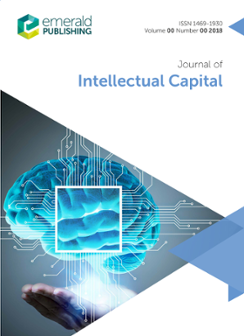Influencing social enterprise resilience by intellectual capital and the contribution of female leadership: insights from the Italian context
IF 6.2
2区 管理学
Q1 BUSINESS
引用次数: 1
Abstract
PurposeThis paper aims to verify which intangible assets attributable to intellectual capital (IC) influence the anti-cyclical nature and the resilience of social enterprises (SEs) during systemic crises and whether these factors take on particular connotations in female-run SEs.Design/methodology/approachA qualitative methodology based on multiple case studies is used to answer the research questions. A set of SEs operating in the catering sector is analyzed. The analysis is carried out by in-depth interviews with male and female managers of SEs to understand which resilience IC factors were most activated during full emergency and recovery stages.FindingsThe results confirm the anti-cyclical nature of SEs and their resilience to systemic crises. No distinct differences emerge between female and male SEs. Concerning the IC, relational capital (RC) is the most relevant intangible asset for small and medium-sized SEs. Internal and external relations support them during the crisis and the consolidation of trusted ties, formal and informal, external and internal, favor the Recovery. The RC is a crucial resource even in bigger SEs, but some differences are detected concerning the smaller ones. In the smaller SEs, informal relations prevail, while formal relations prevail in the larger ones, particularly with institutions. Furthermore, the RC is the sole or primary resource in the smaller SEs, while the bigger SEs can count on more varied intangible resources.Originality/valueThis study offers an original contribution to studies on IC by focusing on the factors little analyzed by existing studies: (1) SE management, (2) the contribution of IC to the resilience of non-profit-oriented enterprises and (3) the search for elements of differentiation between SEs with male and female leadership.智力资本和女性领导的贡献对社会企业韧性的影响——来自意大利的启示
目的本文旨在验证哪些可归属于智力资本的无形资产会影响社会企业在系统性危机中的反周期性和弹性,以及这些因素在女性经营的社会企业中是否具有特定的含义问题。分析了一组在餐饮业运营的SE。该分析是通过对SE的男性和女性管理人员进行深入访谈来进行的,以了解在整个应急和恢复阶段,哪些弹性IC因素最为活跃。研究结果证实了SE的反周期性及其对系统性危机的抵御能力。女性和男性SE之间没有明显的差异。就IC而言,关系资本(RC)是中小型SE最相关的无形资产。内部和外部关系在危机期间为他们提供支持,正式和非正式、外部和内部的信任关系的巩固有利于复苏。即使在较大的SE中,RC也是一种至关重要的资源,但在较小的SE中也发现了一些差异。在较小的SE中,非正式关系占主导地位,而在较大的SE中占主导地位的是正式关系,尤其是与机构的关系。此外,RC是较小SE中的唯一或主要资源,而较大SE可以依靠更多种类的无形资源。独创性/价值本研究通过关注现有研究中很少分析的因素,为IC研究提供了独创性贡献:(1)SE管理,(2)IC对非营利企业韧性的贡献,以及(3)寻找具有男性和女性领导能力的SE之间的差异因素。
本文章由计算机程序翻译,如有差异,请以英文原文为准。
求助全文
约1分钟内获得全文
求助全文
来源期刊

Journal of Intellectual Capital
Multiple-
CiteScore
14.50
自引率
13.30%
发文量
27
期刊介绍:
The Journal of Intellectual Capital is a peer-reviewed international publication dedicated to the exchange of the latest research and best practice information on all aspects of creating, identifying, managing and measuring intellectual capital in organisations. The journal publishes original research and case studies by academic, business and public sector contributors on intellectual capital strategies, approaches, frameworks, tools, techniques and technologies in order to increase the understanding of intellectual capital within the context of the modern knowledge economy. The focus of this journal is on the identification of innovative intellectual capital strategies and the application of theoretical concepts to real-world situations.
 求助内容:
求助内容: 应助结果提醒方式:
应助结果提醒方式:


